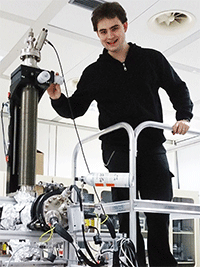Collaborate to Address Complex, National Challenges
By working with other experts and sharing information, we can make significant advances in science and in technological solutions for the nation. See what we offer
Why Collaborate With Us?
Tap into unique capabilities and expertise. For example:

Jonas Warneke received the Feodor Lynen Research Fellowship to advance catalysis research at PNNL. Image copyright: University of Bremen.
- In data sciences and analytics, we work with universities to develop novel capabilities that enable people to gain insights and make decisions on the fly, in a streaming data environment.
- In our Institute for Integrated Catalysis, more than two dozen industry and academic partners collaborate to develop improved catalytic materials and processes for a secure energy future.
- In our Shallow Underground Laboratory, researchers use some of the world's most sensitive radiation detection systems for ultra-low background research and development for environmental, national security, and fundamental physics. The result: breakthroughs in areas ranging from international treaty verification and the search for dark matter in the universe.
Strengthen your research proposals. When sponsors are looking for specific capabilities found in universities, national labs, and/or the private sector, the right alliances can make proposals more competitive. For example:
- The Oregon Health & Science University and PNNL received a grant from the National Institutes of Health in 2015 for detecting metabolites that could provide clues for disease diagnosis. This three-year project combines OHSU's biomedical research and genomics emphasis with PNNL's mass spectrometry and proteomics capabilities.
- In 2016, the Department of Energy funded a three-year biofuel-from-seaweed research project led by Marine BioEnergy, Inc., in collaboration with PNNL and the Scripps Institution of Oceanography at University of California, San Diego. Marine BioEnergy and Scripps develop and test technology for open-ocean cultivation of kelp, and PNNL transforms the kelp into biocrude oil using a catalytic process.
Advance your career. Hundreds of graduate students and post-docs come through our doors every year. While advancing their field of research, they also gain specialized skills from our top experts, co-publish, and open doors to potential employment. Many make professional connections that last for years.
In addition, we support joint appointments with U.S. universities that enable both parties to draw on additional capabilities and expertise. We also host numerous postdoctoral fellows along with graduate and undergraduate students, providing learning experiences for the next generation of scientists.
See more opportunities for post-graduates and faculty.
Contact
Suresh Baskaran
Director, Research Partnerships
